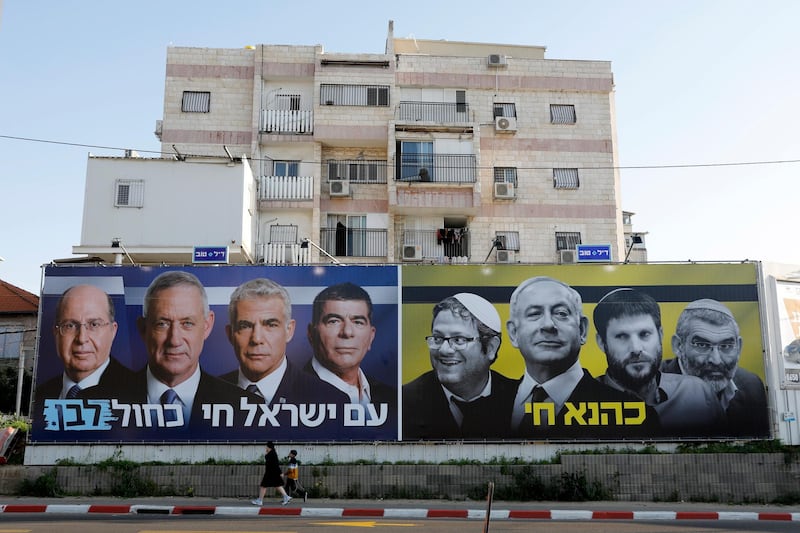Every country conjures up foundation myths to explain how it came into being or transformed into the society it is today. In Israel, these stories tend to hover around the “temporary” nature of the country’s occupation of Palestinian land seized in 1967, and the supposedly liberal values of the state at that time. The upcoming Israeli general election has thrust these myths to the forefront of the conversation about the future of the country and the conflict. More specifically, the Israeli right wing’s surge in power is removing the mask of liberalism from the country’s political discourse.
Let’s address the issue of the temporary nature of the occupation in the Israeli mindset. As soon as Israeli forces occupied the West Bank and Gaza Strip in 1967, the country’s leadership declared it was ready to give back the land in exchange for peace. This rhetorical commitment to peace concealed the actions of successive Israeli governments to further establish their footprint on Palestinian land.
As the largest state project in Israel’s history, the occupation is anything but temporary. Yet, for decades, an extraordinary level of cognitive dissonance existed within Israeli society that allowed it to be simultaneously permanent and temporary.
Now that deeply embedded contradiction is gradually disintegrating.
Over the past two decades, Israeli society has distanced itself from that of the Palestinians, and work permits for Palestinians have dried up. This leaves Israelis in cities such as Tel Aviv feeling as though the conflict and the occupation are things that take place far away and in a manner that doesn’t interfere with their daily reality.
Given this physical and psychological distance from the occupation, and the false notion that it is – and has always been, temporary – many Israelis honestly believe that their country was once in such a position that it could negotiate a workable peace deal.
In reality, Israel enmeshed itself into the West Bank in a manner that has rendered any two-state solution along the contours of the Oslo Peace Accords effectively impossible.
The occupation is not temporary. The status quo, in which Israel maintains sole control over all the land between the Jordan River and Mediterranean Sea, is the best "peace" deal it can get.
These issues have come into sharp focus with the rise of Israel’s political right, ahead of the April elections.
As mainstream candidates such as Prime Minister Benjamin Netanyahu make alliances with extremist parties, it is clear that Israel's nationalist shift is all but complete. Openly racist discourse about Palestinians is now the norm in political debates.
Meanwhile, the ascent of politicians such as Naftali Bennett has shown Israelis and the world that any commitment to peace and the temporary nature of the occupation was a smokescreen.
These politicians have made it clear that they intend to hold on to the West Bank and make no attempt to conceal their prejudice and hostility towards Palestinians.
As distasteful as all this is, it is actually a refreshing shift for Israeli politics, which allows the international community to fully understand the nature of the Israeli side of the conflict.
While the actions of the Israeli government have fundamentally stayed the same – such as endless settlement creation, the maintenance of an apartheid-like system of law in the West Bank, and discrimination towards Palestinian citizens of Israel – the rhetoric has changed.
Liberal and centrist parties once claimed they had no choice but to operate the Israeli government in such an aggressive manner. The popular saying that Israel is a “villa in the jungle” – which supposedly alludes to its western values in the non-western Middle East – captures this tension.The reality, of course, is that centrist and liberal parties in Israel have enabled the situation that we have today.
It was successive Labour governments that authorised funds for West Bank settlements, while arguing in bad faith that they were ready for a peace agreement.
As the Israeli journalist Amira Hass recently noted in the Tel Aviv daily newspaper Haaretz: "Immediately after June 1967, the Labour Alignment government cynically manipulated international law, ravaged the occupied Palestinian lands to Judaise them, and developed bureaucratic methods to reduce the number of Palestinians living in the country."
With the right poised to shore up its power in the April elections, Israeli liberals and their vocal supporters in the west have some soul-searching to do.
The faster Israelis embrace their responsibility for entrenching the occupation to an unsustainable degree, and their utter lack of will for an equitable peace agreement, the quicker the international community can conceive of a new path out of this morass.
As much as Israelis feel the status quo is sustainable, it simply is not in the long run. We have arrived at a contrary point in the conflict where the extremists are speaking truth and the centrists, in all their delusions, are the greatest threat.
Joseph Dana is the editor of emerge85, a project exploring change in the emerging world and its global impact





